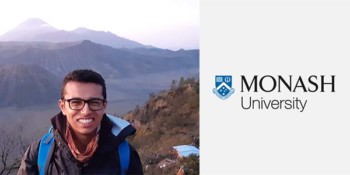Jesse-Lee Dass is a New Colombo Plan Mobility Grant recipient from Monash University. Jesse undertook the Virtual Indonesian Language Short Course in July 2022.
Q: Why did you decide to undertake ILSC?
I had one elective left for my Diploma of Languages in Indonesian studies. I decided to take ILSC because I wanted to use this elective to improve my Indonesian proficiency before heading to Indonesia again in January.
Q: Did you receive a New Colombo Plan Mobility Grant? If yes, why do you think the NCP is an important initiative? The NCP is a signature initiative of the Australian Government which aims to lift knowledge of the Indo-Pacific in Australia by supporting Australian undergraduates on experiences such as the Virtual Indonesian Language Short Course
I received a New Colombo Plan Virtual Mobility Grant. This was a major factor in being able to afford to take this course. It essentially meant I did not need to pay for tuition fees out of pocket.
Q: What did you find to be the most rewarding part of this virtual experience?
I was in level 5 and the classes were almost 100% in Indonesian. As a result, I was immersed in Indonesia for at least 4 hours every day during the course. Moreover, my teachers were very friendly and supportive.
I also really enjoyed the extra-curricular grammar classes as it allowed me to consolidate my understanding of grammar concepts which I could use in class.
Q: What do you find to be the most challenging about the ILSC?
I found the intensive nature to be the most challenging part. At times, it was a bit stressful as assessment needed to be completed in a short amount of time, but all the tasks were small enough to be manageable. In level 5, most assessments were around 200 words.
During my first week of the program, I experienced a bit of Zoom fatigue. I was able to manage it through using speaker mode on Zoom which means you don’t see yourself as you’re talking. This was also managed by the ten minute breaks we had every hour.
Q: Have you had previous experience learning Indonesian in Australia? If yes, how different was the Virtual ILSC to your previous experiences?
The Virtual ILSC is probably one of the closest experiences you could get to an in-country immersion while still in Australia. The course taught by an Indonesian university with Indonesian teachers living in Indonesia. The classes for level 5 involved learning about different topics entirely in Indonesian. I learnt new vocabulary from a range of themes including multiculturalism, the environment, natural disasters, tourism, education, city-planning, and Indonesian society. There was a strong emphasis to speak Indonesian as much as possible.
Q: Were you able to learn about the Indonesian culture from this virtual program? If yes, how was this achieved?
We learnt about Indonesian culture through the topics studied in class, the cultural sharing sessions and the seminars. For example, we learnt about code-switching and Bahasa Gaul in the cultural seminar in the first week.
Q: How will your proficiency in Indonesian Language gained through the ILSC influence your future career or study?
I am interested in working within the Australia-Indonesia space. In order to further improve my proficiency, I am considering taking level 6 with ACICIS.
Q: Would you recommend this virtual program to your friends?
Yes, it was a good alternative to in-country immersion.
Q: Favourite Indonesian word/phrase:
“Hati Beriman” which is an acronym for “sehat, tertib, bersih, indah, aman” (healthy, orderly, clean, beautiful, and safe), which was one of the goals of city-planning in Salatiga.
Q: Describe your experience of the Virtual ILSC in three words:
Lots of notes


